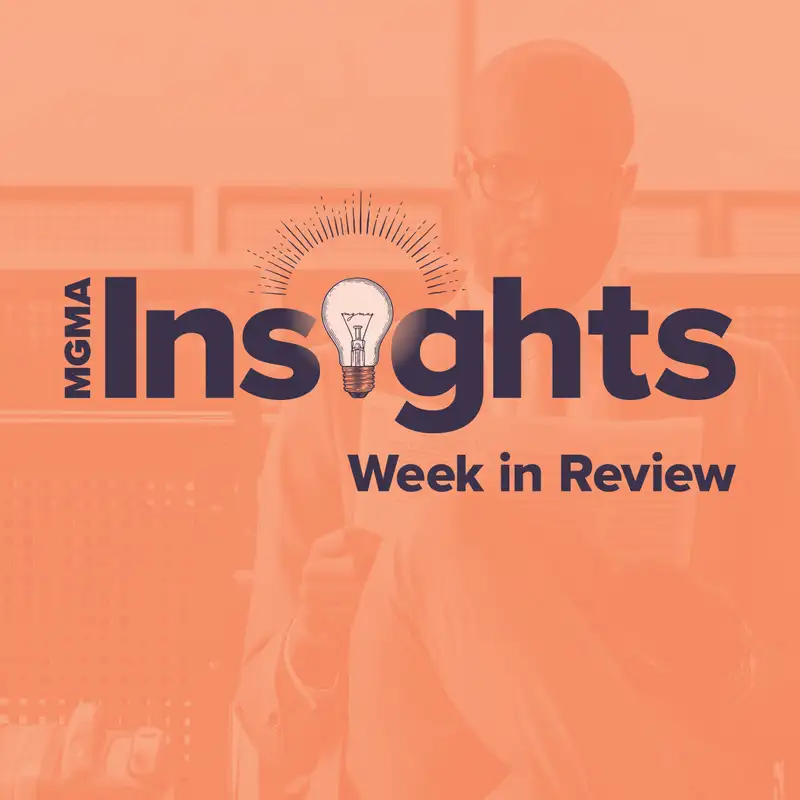MGMA Week in Review: Healthcare Legislation, AI in EHRs, and Employee Monitoring
Download MP3Welcome to this week’s episode of the MGMA Week in Review Podcast, hosted by Daniel Williams, Senior Editor at MGMA, and Colleen Luckett, Editor and Writer at MGMA. In today’s episode, we cover a range of critical topics affecting healthcare leaders, including a wave of bipartisan health legislation passed in the U.S. House of Representatives, the complexities of employee monitoring in healthcare, and the role of artificial intelligence (AI) in streamlining electronic health records (EHRs). We also dive into the rising DIY medicine trend and discuss important cybersecurity measures for healthcare organizations.
Key Takeaways:
- Bipartisan Health Legislation:
- This week, the U.S. House of Representatives passed 14 bipartisan health bills, all aimed at improving the well-being of Americans. The focus is on strengthening Medicaid and Medicare, preventing fraud, and supporting vulnerable populations, such as individuals with Down syndrome.
- These bills include the Medicaid Program Improvement Act and the Fraud Prevention Act. A key aspect is the extension of telehealth provisions for Medicare, which could significantly improve access for non-English speakers and diabetes prevention programs. “Almost all 14 bills passed unanimously, signaling strong bipartisan cooperation in Congress,” said Colleen.
- Employee Monitoring in Healthcare:
- Daniel highlighted an article from Becker’s Hospital Review on employee monitoring in healthcare. The article stresses the importance of transparency, legal compliance, and employee morale when implementing monitoring systems.
- “Transparency is essential. Employees are more likely to accept monitoring if they understand why it’s being done,” Daniel quoted from the article. Leaders must balance monitoring for operational improvements without compromising employee trust and morale.
- DIY Medicine:
- Colleen explored the DIY medicine movement, where patients turn to online communities to create their own versions of prescription drugs, such as GLP-1 weight loss medications. This trend reflects growing frustration with high healthcare costs and limited access to medical care.
- While this offers patients a sense of control over their treatments, healthcare professionals warn of the dangers. “Healthcare professionals like Michael Snyder from Rose Medical Center in Denver advise patients to consult their doctors before attempting any DIY hacks,” Colleen mentioned.
- AI in EHRs:
- The episode also covers how AI is helping reduce physician frustrations with EHRs. AI tools can automatically capture and input data, allowing doctors to focus more on patient care. However, AI isn’t a universal fix and could introduce new complexities.
- Daniel shared a physician's testimonial: “I spend less time charting and more time talking to my patients, which is why I became a doctor in the first place.” This reflects the potential for AI to enhance doctor-patient interactions.
- Cybersecurity in Healthcare:
- The MGMA Stat Poll revealed that 72% of medical group practices have increased their cybersecurity spending due to heightened threats and the growing reliance on cloud-based platforms.
- Daniel discussed his recent interview with Chris Bevil, Chief Information Security Officer at InfoSystems, who emphasized the importance of clear AI security policies in healthcare. “Generative AI isn’t going to take your job unless you refuse to adapt to it,” Bevil noted, underscoring the need for secure and effective AI use.
Resources Mentioned:
- Bipartisan Health Bill
- Fierce Healthcare: Healthcare Legislation
- Becker’s Hospital Review: Employee Monitoring – 4 Things Leaders Should Know
- Axios: DIY Medicine
- Medical Economics: AI Cuts Physician Time and Frustration with EHRs in Some Instances
- MGMA Stat Poll Results
Connect with MGMA:
- Visit our website: MGMA.com
- Follow us on LinkedIn: MGMA LinkedIn
- Follow us on Twitter: @MGMA
Subscribe and Leave a Review:
If you enjoyed this episode, please subscribe and leave us a review on your favorite podcast platform. Your feedback helps us improve and reach more listeners!
Podcast Sponsor MGMA BestPrice
Managing your supply chain doesn’t have to be complicated. MGMA BestPrice — the exclusive GPO for MGMA members — can help your practice save up to 20% on medical supplies, pharmaceuticals, vaccines, office essentials, employee perks, waste management and more. This free national member benefit connects you to some of the most competitive pricing in the industry, helping every dollar saved become a dollar reinvested into better patient care and stronger operations. Learn how to start saving today at mgmabestprice.org.
Managing your supply chain doesn’t have to be complicated. MGMA BestPrice — the exclusive GPO for MGMA members — can help your practice save up to 20% on medical supplies, pharmaceuticals, vaccines, office essentials, employee perks, waste management and more. This free national member benefit connects you to some of the most competitive pricing in the industry, helping every dollar saved become a dollar reinvested into better patient care and stronger operations. Learn how to start saving today at mgmabestprice.org.

